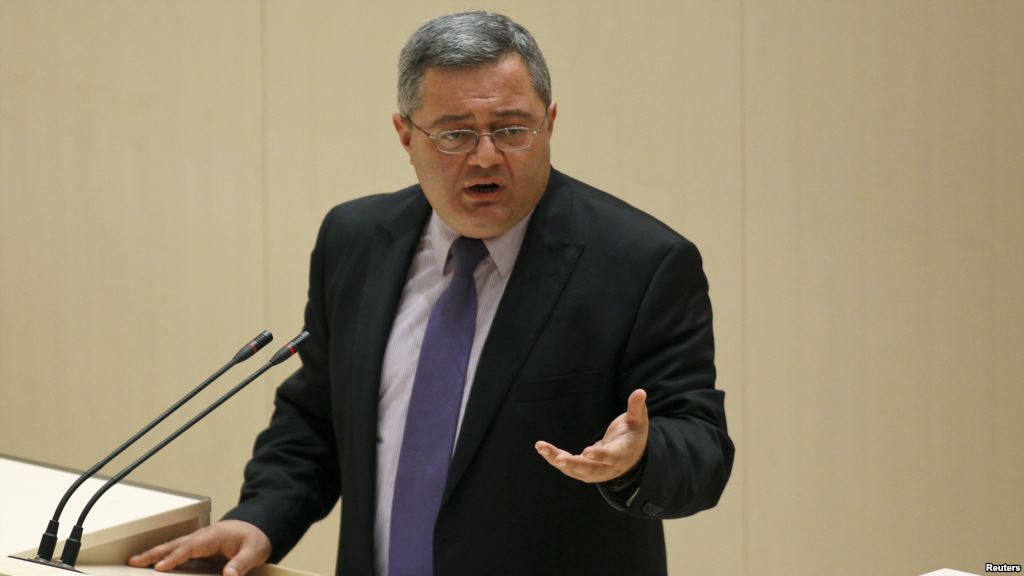
Georgian Parliament Once Again Alters Constitution
Publication: Eurasia Daily Monitor Volume: 10 Issue: 181
By:

On October 4, the Georgian parliament passed further amendments to the new Georgian constitution. The country’s new constitution was adopted in October 2010 under President Mikheil Saakashvili and will go into effect after the upcoming presidential election on October 27, 2013. It turns the president largely into a symbolic figure and increases the powers of the prime minister (PM).
The October 4 amendments to this document further modify Georgia’s political system by significantly cutting the powers of the PM in favor of the parliament. Specifically, the legislature voted to maintain the provision from the current constitution that requires the entire government, as well as the PM, to be re-confirmed by the parliament in the event that one third of the ministers changes. Without this amendment, the new constitution would have allowed the PM to change the entire cabinet without the parliament’s authorization. Additionally, a further adopted amendment will deprive the PM of the power to initiate a no-confidence vote against any government-sponsored bill—a clause that was imbedded in the new constitution to strengthen the head of government’s control over his or her own cabinet. Other amendments are related to the president’s powers over the parliament (civil.ge, October 4).
While, at first glance, the new series of constitutional amendments appear to be a democratic effort aimed at increasing the balance of power between the executive and legislative branches, in fact they represent an attempt to tailor the new constitution to the needs of individual power brokers in Georgia. These changes mean several things to a number of power holders in the country. First of all, they enable outgoing Prime Minister Bidzina Ivanishvili (see, EDM, September 9) to impose his informal control over the Georgian political system. Although, Ivanishvili has not yet named his immediate successor, the new candidate for the PM position will almost certainly be an obedient figure, not unlike Giorgi Margvelashvili, Ivanishvili’s handpicked presidential candidate (1tv.ge, May 11). However, Ivanishvili apparently does not intend to rely entirely on the new PM’s obedience and loyalty. The October 4 constitutional amendments will ensure that if the next PM becomes disobedient and overly independent-minded, he will still be constitutionally weak enough not to pose a challenge to the political order that Ivanishvili is leaving. When the new amended constitution comes into force, the head of government will be controlled by the parliament where Ivanishvili’s Georgian Dream (GD) political bloc holds a majority. In fact, Ivanishvili appears to be designing a political system in which he will be able to control and play all the figures on the political chessboard.
In fact, Ivanishvili’s desire to weaken the next PM and strengthen the parliament overlaps with the preferences of Davit Usupashvili, Parliamentary Speaker and the leader of Georgia’s Republican Party, who never hid his goal of bestowing more power on the legislative branch (TV 9; Rustavi 2, May 8). However, Usupashvili does not intend to stop here. On October 4, the legislature also endorsed a decision to establish within one month a state commission that will develop further major constitutional changes before September 2014. Importantly, the commission will be chaired by Usupashvili himself (civil.ge, October 4). It is not yet known what exactly the changes will be; however, it is clear that Speaker Usupashvili and the GD-dominated parliament will do their outmost to redirect even more power unto the parliament based on the desires of the Republican Party and the GD coalition (open.ge, January 24).
The recent constitutional changes reinforce the dangerous trend in Georgian politics of devaluing the constitution, which is supposed to be the most respected and highest law of the land. Repeated amendments set a negative example that the constitution can be altered according to the whims of any government in power. Since independence, the country’s successive governments have been notorious for constantly amending and changing the document. For instance, just during President Saakashvili’s nine-year rule, the Georgian constitution underwent 105 changes and amendments (not counting the dozens of amendments adopted by the Saakashvili administration that went into forming the new constitution, which has yet to enter into force) (https://www.parliament.ge/index.php?option=com_content&view=article&id=180&Itemid=85&lang=en). Some of these changes immensely increased President Saakashvili’s powers.
Such frequent changes likely reduce the respect toward the constitution as well as hurt the rule of law and political stability in the country. It seems that the current government is continuing this self-destructive tradition. Although Usupashvili stressed the need to create a constitution that will not be frequently altered (gurianews.ge, January 23), it remains to be seen whether the ruling authorities will stick to this pledge.
The history of modern Georgian politics to date suggests that further constitutional modifications are more likely than not. This promises more political instability, uncertainty and, hence, the inefficiency of governance. In extrapolating this trend, it seems likely that as new power brokers emerge in the country in the future, new constitutional changes will be put in place in order to accommodate their immediate political needs. But these changes may do little to foster a stable and workable constitutional system that would provide sound governance as the country struggles with resolving current and future deep economic and political crises.




